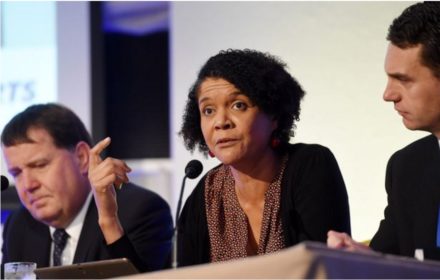
In June last year, Labour might not have won the general election – but our message won hearts and minds across the country. We were able to inspire people of all ages and almost all backgrounds with a manifesto that offered hope.
Our message was a positive one, but it was aided by a real sense that under the Conservatives the economy has been moving backwards for ordinary people. The austerity agenda – what I call George Osborne’s zombie economics – has led to a crisis of social mobility and reduced the opportunities available to ordinary people. In the north-east we have felt this acutely: savage welfare cuts have led to 40,000 people depending on Trussell Trust food banks each year while we have seen 40 per cent of our SureStart centres close permanently.
As a child growing up in Newcastle, I benefited from a great comprehensive school, an affordable council house and a fantastic health service. That is how a poor, black, working-class girl could become a chartered engineer and, later, member of parliament for my home town.
After eight years of Conservative rule I worry that the same opportunities are not available to my constituents now – the impact of austerity on public services is holding them back. But what is also holding them back is Conservative failure on the economy, with family incomes stagnant since the financial crisis. According to the ONS, the value of median income for non-retired households was £29,300 in 2017, only £100 per year higher than in 2008.
The reality is that while the public sector has shrunk, our economy has failed to provide the jobs and wage growth people need. Today 3.8 million workers are in poverty across the UK – that’s one in every eight – and 5.7 million are in jobs that pay less than the (true) living wage. Real wages have fallen 10 per cent in the last years, a drop comparable only to Greece among the developed countries. In the north-east, the average worker is £4,000 per year poorer than 10 years ago.
It was in the 2000s under a Labour government that we last saw a period of rapid and sustained growth in median household incomes. But we failed to fundamentally change our country’s economic model and fully reverse the rollback of our public services.
We were told that with the state out of the way, the private sector would flourish. But what flourished instead is what academics and commentators call a ‘financialised’ economy – one dominated by market-based trading that creates profits without producing anything.
Financialisation has been a big success for shareholders and executives. But it has severely hampered our ability to produce wealth collectively and prevented the rewards of growth from being shared equally.
In my contribution for the Fabian Society’s new Raising the Bar report, I argue that the government must do more than stimulate the economy and redistribute wealth. Not only would this fix our economy’s long-standing weaknesses, but it would also get family incomes growing like they used to. We need to ensure that we have broad-based economic growth in the first place – and we can do that with an industrial strategy based on a vision for the high-wage, high-skill, high-productivity economy that we want to build.
The last 40 years have shown us that it matters where growth comes from, as the absence of vibrant local economies destroys the fabric of communities and damages quality of life. While the British economy needs to create value, it must create much more than just financial value in the form of shareholder profit – there must also be social value through the creation of jobs, goods and services so that we can all live richer lives in a richer Britain.
Investment is driven by business perceptions of where the future opportunities are for growth, and mission-oriented policies create these opportunities, bringing public and private sector investors together in pursuit of a shared goal.
Labour’s industrial strategy takes a mission-orientated approach, recognising that our country has great strengths we can build on: our world-class universities and extraordinary heritage of scientific research, our booming creative industries and our cutting-edge manufacturers, from ceramics to steel and to automotive. A Labour government will take bold steps to make the most of these strengths and provide support and investment where it is needed.
Our approach is positive and practical. It speaks to the student anxious about his or her future, the single mum working two minimum wage jobs, and the Redcar steelworker wanting a job to be proud of. It addresses the crisis in productivity, skills and wages, which keeps us poor even with unemployment relatively low.
We have set out two initial missions. First, to decarbonize the economy with 60 per cent of our energy drawn from renewable sources by 2030. Second, to build an ‘innovation nation’ with 3 per cent of our GDP spent on research and development and the highest percentage of highly skilled jobs in the OECD.
Achieving these missions will involve investment in skills, infrastructure and good, productive work. In government, Labour will take advantage of historically low interest rates to borrow £250bn for infrastructure spending over 10 years. We will set up a network of regional investment banks across the country. And we will create a National Education Service, allowing people to retrain throughout their lives. These are the foundations upon which we will get the economy growing and ensure family incomes start to rise again.
Chi Onwurah is MP for Newcastle upon Tyne Central and shadow minister for science, innovation and industrial strategy.
She has contributed to the Fabian Society’s new Raising the Bar report, published today.




More from LabourList
Government announce SEND reform in schools white paper
SPONSORED: ‘Industrial hemp and the challenge of turning Labour’s priorities into practice’
‘A day is a long time in politics, so we need ‘action this day’’